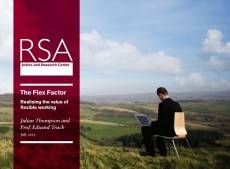July 16, 2013
Corporate Real Estate executives predict strong global economic outlook
The global economic outlook is strong for the second half of 2013, while the prospects for corporate growth and expansion are also increasing, according to the views of corporate executives surveyed in June for the new CoreNet Global Confidence Index. Nearly two-thirds (62.5%) rated their outlook on the global economy for the coming six months as optimistic to very optimistic, compared to a year ago. Most (72.4%) reported the likelihood that flexible, open workplace strategies will increase, while space per work setting and/or work settings per supported worker will be reduced.
























July 12, 2013
The challenge in Silicon Alley is providing the right quantity and quality of office space
by Charles Marks • Comment, Facilities management, Property, Workplace design
(more…)